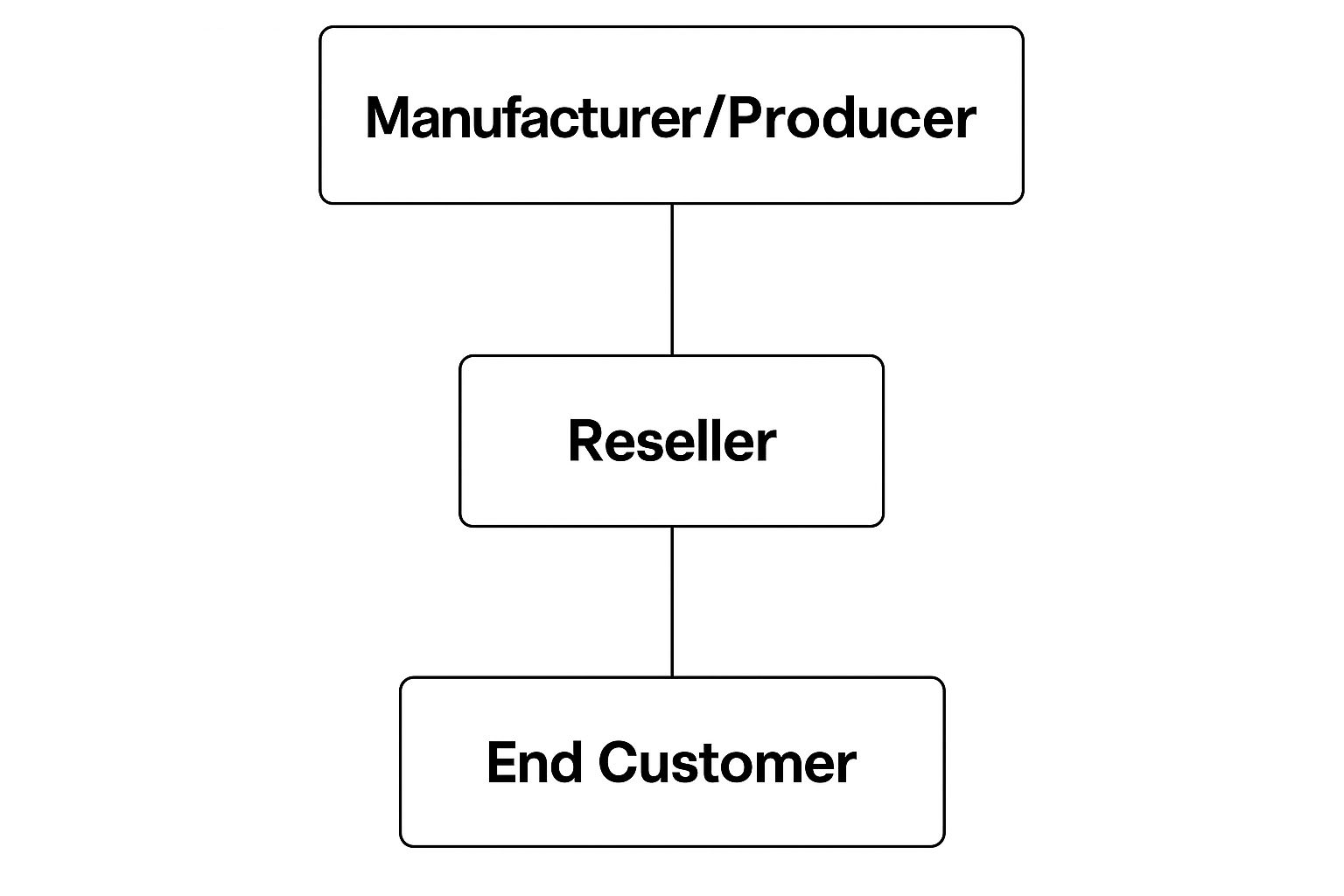A white label reseller is a business that buys a finished product or service from another company, puts its own brand on it, and sells it directly to customers. It’s a way to launch a high-quality offering almost overnight, completely sidestepping the massive costs and headaches of developing something from scratch.
Think of it as putting your own label on a solution that’s already been built and perfected by experts.
Let's use a simple analogy. Imagine a fantastic local coffee shop that wants to sell its own signature blend. Instead of buying land, growing beans, and mastering the complex art of roasting—a huge undertaking—they find a master roaster who supplies them with phenomenal, unbranded coffee. The shop then bags it, slaps their own logo on it, and sells it as their unique blend.
That’s the white label model in a nutshell.
This approach empowers entrepreneurs and established businesses to broaden their services without the crushing overhead of research, development, and manufacturing. You're basically licensing a complete product and pouring all your energy into what you do best: marketing, sales, and cultivating great customer relationships.
The whole setup is beautifully simple, built on a clear division of labor. Once you get the roles, you'll see how powerful this can be.
This graphic shows just how direct the process is. The producer creates the product, but the customer only ever sees your brand.

As you can see, your brand is the critical link. You’re delivering a polished, final product to the consumer, and the original manufacturer remains completely behind the scenes.
It's easy to get these terms mixed up, but they represent very different business models. This table breaks down the key distinctions to clarify exactly what makes white label reselling unique.
Understanding these differences is crucial. With white labeling, you get the benefit of having your own branded product without the high costs and long timelines of private labeling, and you maintain full control over your customer relationships, unlike affiliate marketing.
The appeal of white labeling is exploding as technology gets more and more complex. It's no surprise that the global white-label software market is booming, with some forecasts predicting its value will rocket past $225 billion by 2027. This growth is fueled by the rise of Software-as-a-Service (SaaS), where reselling a proven platform is just smarter and faster than trying to build one from the ground up. You can dive deeper into these market trends and the future of white label programs to see where things are headed.
The core value proposition is speed. A white label reseller can launch a sophisticated new service in a matter of days or weeks, a process that would otherwise take months or even years of development and millions in investment.
This speed-to-market is a massive competitive advantage. It lets you pivot quickly to meet new demands and start bringing in revenue almost right away. Instead of sinking your budget into developers and engineers, you can invest directly in marketing and customer acquisition, paving a much quicker path to profitability. In essence, this model removes the biggest barriers to offering advanced, in-demand services.

So, why are so many entrepreneurs and agencies jumping on the white label bandwagon? It’s not just about convenience. This model represents a smarter, more agile way to grow a business. When you become a white label reseller, you unlock some powerful advantages that give you a serious leg up in a crowded market.
The benefits compound quickly, laying a solid foundation for profitability and rapid growth. You get to skip the years of expensive, uncertain development and go straight to market with a proven, professional service.
Building a brand people trust takes ages. White labeling is the ultimate shortcut. By putting your own brand on a high-quality, pre-built service, you can offer your clients a polished, professional solution from day one.
Think about a digital marketing agency that’s great at social media. They see a huge opportunity to offer AI-powered receptionist services to their small business clients but have zero clue how to build one. Instead of starting from scratch, they can partner with a white label provider and instantly add a sophisticated AI service to their menu—all under their own name.
This approach lets you borrow the credibility of an already perfected product. Your clients see a reliable, seamless service under your trusted brand, which only reinforces their view of you as an industry leader and a one-stop shop.
This immediate boost in authority allows you to compete with bigger, more established companies without the massive upfront investment they had to make.
In business, timing is everything. Creating a new product from the ground up is a long, painful process. You’ve got research, prototyping, testing, and endless revisions. This can easily drag on for months, if not years, all while you’re not making any money from it.
The white label model completely flips that timeline. You can launch a brand-new service in a matter of days. The product is already built, tested, and ready to go. Your job is to handle the branding, set your prices, and start marketing—tasks you can knock out in a tiny fraction of the time.
This speed means you can be incredibly nimble. You can jump on market trends as they pop up, adding new services to meet customer demand almost instantly.
This is probably the most powerful advantage of all: the dramatic cost savings. The financial weight of developing a service in-house is just staggering. It includes:
As a white label reseller, you get to sidestep every single one of these expenses. Your provider has already shouldered these costs, giving you the finished product for a predictable fee. This frees up your cash to invest where it counts—getting customers and growing your business. For anyone curious about this model, you can find out more about starting your own white label AI business and see just how accessible it is.
This financial efficiency doesn't just boost your profits; it lowers the barrier to entry, making it possible for smaller agencies and solo entrepreneurs to offer advanced services that were once only available to massive corporations.

The world of white labeling is massive. Just deciding to be a white label reseller isn't a business plan—it's a starting point. To truly succeed, you need to find your own profitable corner of the market, a niche you can dominate. This all starts by finding a sweet spot where high demand meets your own skills and existing customer base.
The most resilient reseller businesses I've seen are built on recurring revenue. It’s what gives you that predictable, stable income month after month. So, let’s skip the generic fluff and get into the real high-growth areas where you can build something that lasts.
Here’s an evergreen field: digital marketing. Why? Because every single business on the planet wants more customers. This constant need means agencies and consultants are always looking for ways to offer more services without bloating their payroll, making it a perfect setup for white labeling.
These services are sticky. When clients see results that build over time, they’re far less likely to jump ship.
If you’re looking for scalability and recurring revenue, Software-as-a-Service (SaaS) is arguably the most powerful white label niche out there. The model is simple: you sell access to a software platform under your brand, and your clients pay you a subscription fee, usually monthly or annually.
The real magic of white label SaaS is that the provider handles all the headaches—the coding, the server maintenance, the bug fixes, and the feature updates. You get to sell a polished, market-ready piece of software without ever writing a single line of code.
Think about a consultant who works with local home service businesses. They could easily resell a white-label CRM to help their clients track leads or a project management tool to organize their jobs. Instantly, the consultant has a valuable, branded tool in their toolkit, which strengthens client relationships and opens up a brand-new, stable income stream.
The most explosive growth happening right now is in AI-powered tools. Businesses, big and small, are desperate to use AI to get more efficient and improve their customer service, but they're overwhelmed and don't know where to begin. This knowledge gap creates a massive opportunity for a smart white label reseller.
A perfect example is reselling an AI front desk service. Imagine offering an intelligent virtual receptionist that answers calls, books appointments, and qualifies leads 24/7. You could sell this solution to:
You’re not just selling them a tool. You’re selling them a fix for a huge business problem: missed calls and lost revenue.
Another incredibly profitable area is white-label Pay-Per-Click (PPC) advertising. Countless marketing agencies want to offer Google Ads or Facebook Ads management, but they just don't have the in-house expertise. It's a highly specialized skill.
The global PPC market is projected to hit nearly $22.5 billion by 2025, and you can bet white label partnerships are a huge driver of that growth. By reselling a PPC management service, you own the client relationship while certified experts handle the complex bidding strategies and ad optimizations. To get a better sense of this opportunity, you can read more about how white label PPC can grow your agency.

Let's be blunt: choosing your white label partner is the single most important decision you'll make in this venture. Your entire business as a white label reseller hinges on the quality, reliability, and support of the company working behind the curtain. A great partner will feel like a true extension of your team, fueling your growth. A bad one? They become a constant source of headaches for you and, worse, for your customers.
This isn’t about getting wowed by a slick sales deck. It's about doing your homework and forging a partnership that truly sets you up for success. Here’s what you need to dig into when vetting potential providers.
Before you even glance at branding options or pricing sheets, you have to be 100% confident that the core product is rock-solid. If the service itself is glitchy, unreliable, or just plain clunky to use, it's your brand that takes the hit. Your reputation is on the line with every sale.
The best way to start? Become a customer. Sign up for a trial and really put the product through its paces. Does it actually do what it promises? Is the user interface intuitive? If you’re testing something like an AI receptionist, make some test calls. Check the call quality, how quickly it responds, and if its answers are accurate.
A provider’s product is a direct reflection of their standards. If they cut corners on their own product, they will almost certainly cut corners on their reseller support.
And don't just run through the perfect, best-case scenarios. Try to break it. Push its features to their absolute limits. You can only feel confident putting your name on a service after you've stress-tested it yourself.
When something goes wrong—and eventually, it will—you need answers, and you need them fast. Your clients will come to you for support, and you’ll need to lean on your partner for anything complex. A provider with slow, unhelpful, or hard-to-reach support is a massive red flag.
Look for partners that offer dedicated support channels just for their resellers. It shows they get that your needs are different from a regular customer's. During your conversations, ask the tough questions:
The best partners are invested in your success. They won't just hand you the keys; they'll provide comprehensive onboarding, sales playbooks, and technical guides to help you launch smoothly and keep your clients happy.
At the end of the day, your business has to make money. You need to carefully dissect the partner's pricing structure to make sure it leaves you with a healthy profit margin. You need enough wiggle room to cover your own marketing and operational costs while still offering a price that’s competitive in the market.
This is especially true in fast-moving industries. The white-label SaaS reseller market, for instance, is projected to explode, growing at a compound annual rate of about 28% through 2027, largely driven by niche solutions and integrated AI. To ride that wave, you need a partner with a fair and flexible pricing model. You can learn more about the opportunity for SaaS resellers to get a better sense of the potential here.
A true white label product should be a blank canvas. How deep does the customization go? At a minimum, you should be able to slap your logo on it, apply your brand colors, and run it all from your own domain. The ultimate goal is to make the provider totally invisible to your customers.
For those who are more technically inclined, strong API access is a must-have. A well-documented API allows you to deeply embed the service into your own website or application, creating a seamless, fully integrated experience for your customers and automating key parts of your workflow.
Alright, theory is one thing, but putting it into practice is where the real fun begins. Let's walk through the steps to get your white label business off the ground. Think of this as your roadmap, moving you from learning about the model to actually earning from it. This is how you build a solid foundation for your new venture.
First things first: you absolutely must nail down your niche and target audience. Who, specifically, are you trying to help? "Small businesses" is way too broad. You need to get granular. For example: "I'm going after solo law firms that are losing leads after hours because no one is there to answer the phone." That level of focus is your north star for every decision you make from here on out.
Once you know exactly who you're serving, you can start checking out potential partners. Use the criteria we talked about earlier to find a provider that offers something your niche desperately needs—like AI front desk services for all those service-based businesses that can't be tied to a phone.
With a niche and a potential partner in your sights, it's time to build your brand. This is so much more than just a logo and some colors. It’s the entire experience your customer has with you.
Your brand is your promise. It needs to shout trustworthiness, reliability, and the unique value you're bringing to the table. Think about your company name, your color palette, and the tone you'll use in your marketing. A brand targeting high-end financial advisors will have a completely different feel than one aimed at local hair salons.
Remember, as a white label reseller, your brand is your single greatest asset. The provider’s technology is the engine, but your brand is the vehicle your customers will see, trust, and ultimately, buy from.
Next up, you need to package your services and figure out your pricing. Your white label partner gives you the wholesale cost, and it's your job to mark it up to a retail price that leaves you with a healthy profit margin while still being a no-brainer for your clients.
A great strategy is to create tiered packages. This lets you appeal to businesses with different needs and budgets.
This approach not only widens your potential market but also gives your clients a clear path to upgrade as their own business scales.
Finally, it's go time. This is where you create your marketing message and start hunting for those first few customers. Get a simple website up, create some compelling sales material, and start reaching out to that specific audience you defined earlier. The goal right now is just to land your first clients, prove your model works, and get some real-world feedback.
For those looking to dive in with AI services, the process is incredibly straightforward. Platforms like My AI Front Desk were built for exactly this. To see just how simple it can be, you can complete the My AI Front Desk reseller registration and start exploring the platform. This is your blueprint for turning a great idea into a real, revenue-generating business.
Alright, let's bring this down from the clouds and look at a real-world, high-demand example. One of the most interesting white label opportunities popping up right now is in AI-powered services—specifically, virtual receptionists. This isn't just a concept; it's a plug-and-play business model that directly tackles a massive headache for small businesses everywhere.
To really get a feel for how this works, we can use a platform like My AI Front Desk as a perfect case study. It shows exactly how a complex AI service can be rebranded and sold by a white label reseller, opening up a brand-new revenue stream with surprisingly few hurdles to get started.
At its heart, the product you’re offering is an intelligent, 24/7 front desk. This isn't some clunky chatbot. We're talking about a conversational AI that can manage vital business communications around the clock.
Here's what your clients get when they sign on with you:
Just think about the immediate value that delivers. You’re not just selling a piece of software; you're selling a direct solution to lost revenue. Your ideal clients—law firms, beauty salons, medical clinics, and home service pros—are desperate to capture every single lead. A missed call is a missed opportunity, and you're handing them the perfect fix.
So, how do you actually become a reseller for a service like this? The whole process is designed to be incredibly simple, letting you pour your energy into your brand and sales, not into wrestling with tech. Here’s a quick look at what that journey looks like.
1. Sign Up for the ProgramFirst things first, you join the provider's white label program. This usually just takes a few minutes and gets you access to a dedicated reseller dashboard. Think of this as your mission control for managing your brand and all your future clients. For anyone curious about this first step, you can check out our guide on how to sign up as a white label reseller for My AI Front Desk to see just how straightforward it is.
2. Make the Dashboard Your OwnNext up, you turn the generic "white label" platform into your platform. This is the fun part. You’ll upload your company logo, pick your brand colors, and set up a custom domain. When your clients log in, they see a portal that looks and feels 100% like your business. The original provider stays completely in the background, which builds trust in your brand.
3. Set Your Own PricesYou get total control over what you charge your clients. The provider gives you a wholesale cost, and you decide on the retail price. This is your chance to get creative and build different subscription plans—maybe a basic tier for solo operators and a premium plan with more bells and whistles for bigger teams. That flexibility is key to maximizing your profit margins while still offering great value.
A huge feature of the best programs is integrated billing through systems like Stripe. This means the platform automatically handles the recurring payments for you, so you're not stuck chasing down invoices every month. You just set the price, and the system takes care of the rest.
4. Bring Your First Clients AboardOnce your brand and pricing are locked in, you’re ready to start selling. You'll create new accounts for your clients right inside your reseller dashboard. From there, you can even toggle which features each client gets, letting you tailor your service tiers perfectly. Your client gets a powerful AI receptionist, and you start building a steady stream of recurring monthly income.
When you're first exploring the world of white-label reselling, a few practical questions always come up. Let's tackle the most common ones head-on so you can move forward with confidence.
It absolutely can be. The real question of profitability comes down to your chosen niche, how you price your services, and the wholesale cost from your partner. For high-demand digital services like SaaS and AI tools, it's not uncommon to see some very healthy margins, sometimes ranging from 50% to over 200%.
How is that possible? Your provider is the one shouldering the massive costs of development, infrastructure, and ongoing maintenance. This lets you focus your investment purely on what you do best—winning over and supporting your customers—which creates a much more direct path to revenue.
The core difference is all about branding and who "owns" the customer relationship. A distributor sells a product under the original manufacturer's name. Think of a local electronics store selling a Sony TV—everyone knows Sony made it.
As a white-label reseller, you're selling the service under your brand. Your clients buy from you, get support from you, and see your name on everything. The original creator stays completely invisible in the background. This is a huge advantage, as it positions you as the expert and the owner of the service.
For a deeper dive, check out our ultimate guide to succeeding as a white label reseller for more insights.
Not usually, no. The best white-label programs, especially for things like software or marketing services, are built to be "plug-and-play." Your partner is the one responsible for handling all the complicated technical stuff behind the curtain.
Your most important skills aren't coding or engineering. Success comes from focusing on your strengths in marketing, sales, and delivering an amazing customer experience. The tech part is already handled for you.
This model is fantastic because it lets you offer sophisticated, high-tech solutions without needing to be a software developer yourself. Your job is to be the bridge that connects a great product with the right customer.
This is almost always a team effort between you and your provider. It typically works on a tiered model, which is simpler than it sounds:
A great partner won't just leave you hanging. They'll arm you with training materials, detailed knowledge bases, and a direct line of contact to their experts. This partnership ensures you can confidently support your customers without having to be a technical wizard yourself.
Ready to start your own white-label AI business? With My AI Front Desk, you can offer a sophisticated AI receptionist service under your own brand. We handle the tech while you handle the growth. Become a reseller today
Start your free trial for My AI Front Desk today, it takes minutes to setup!








